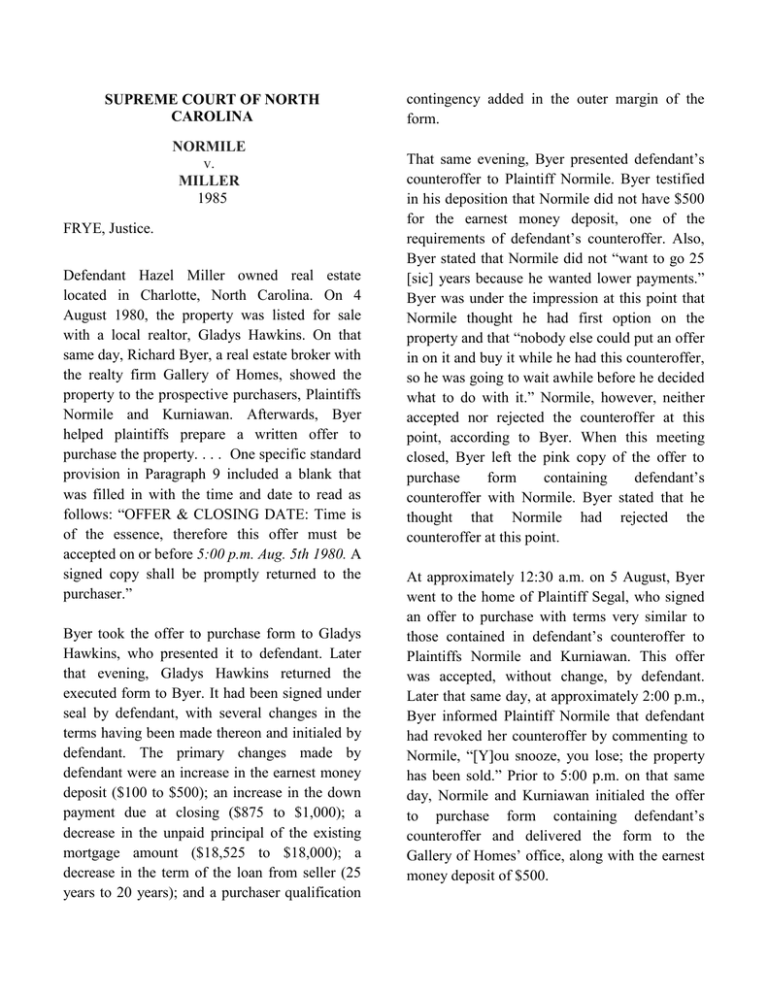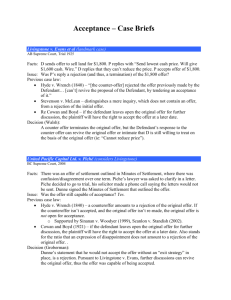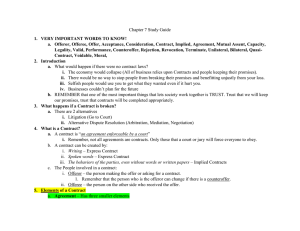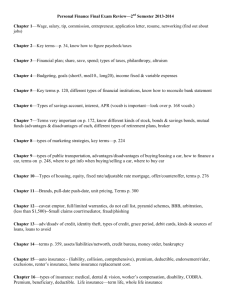SUPREME COURT OF NORTH CAROLINA NORMILE v. MILLER
advertisement

SUPREME COURT OF NORTH CAROLINA NORMILE v. MILLER 1985 FRYE, Justice. Defendant Hazel Miller owned real estate located in Charlotte, North Carolina. On 4 August 1980, the property was listed for sale with a local realtor, Gladys Hawkins. On that same day, Richard Byer, a real estate broker with the realty firm Gallery of Homes, showed the property to the prospective purchasers, Plaintiffs Normile and Kurniawan. Afterwards, Byer helped plaintiffs prepare a written offer to purchase the property. . . . One specific standard provision in Paragraph 9 included a blank that was filled in with the time and date to read as follows: “OFFER & CLOSING DATE: Time is of the essence, therefore this offer must be accepted on or before 5:00 p.m. Aug. 5th 1980. A signed copy shall be promptly returned to the purchaser.” Byer took the offer to purchase form to Gladys Hawkins, who presented it to defendant. Later that evening, Gladys Hawkins returned the executed form to Byer. It had been signed under seal by defendant, with several changes in the terms having been made thereon and initialed by defendant. The primary changes made by defendant were an increase in the earnest money deposit ($100 to $500); an increase in the down payment due at closing ($875 to $1,000); a decrease in the unpaid principal of the existing mortgage amount ($18,525 to $18,000); a decrease in the term of the loan from seller (25 years to 20 years); and a purchaser qualification contingency added in the outer margin of the form. That same evening, Byer presented defendant’s counteroffer to Plaintiff Normile. Byer testified in his deposition that Normile did not have $500 for the earnest money deposit, one of the requirements of defendant’s counteroffer. Also, Byer stated that Normile did not “want to go 25 [sic] years because he wanted lower payments.” Byer was under the impression at this point that Normile thought he had first option on the property and that “nobody else could put an offer in on it and buy it while he had this counteroffer, so he was going to wait awhile before he decided what to do with it.” Normile, however, neither accepted nor rejected the counteroffer at this point, according to Byer. When this meeting closed, Byer left the pink copy of the offer to purchase form containing defendant’s counteroffer with Normile. Byer stated that he thought that Normile had rejected the counteroffer at this point. At approximately 12:30 a.m. on 5 August, Byer went to the home of Plaintiff Segal, who signed an offer to purchase with terms very similar to those contained in defendant’s counteroffer to Plaintiffs Normile and Kurniawan. This offer was accepted, without change, by defendant. Later that same day, at approximately 2:00 p.m., Byer informed Plaintiff Normile that defendant had revoked her counteroffer by commenting to Normile, “[Y]ou snooze, you lose; the property has been sold.” Prior to 5:00 p.m. on that same day, Normile and Kurniawan initialed the offer to purchase form containing defendant’s counteroffer and delivered the form to the Gallery of Homes’ office, along with the earnest money deposit of $500. Separate actions were filed by plaintiffappellants and -appellee seeking specific performance. Plaintiff Segal’s motion for consolidation of the trials was granted. Defendant, in her answer, recognized the validity of the contract between her and Plaintiff Segal. However, because of the action for specific performance commenced by Plaintiffs Normile and Kurniawan, defendant contended that she was unable to legally convey title to Plaintiff Segal. Both plaintiffs filed a motion for summary judgment. Plaintiff Segal’s motion for summary judgment was granted by the trial court, and defendant was ordered to specifically perform the contract to convey the property to Segal. Plaintiffs Normile and Kurniawan appealed to the Court of Appeals from the trial court’s denial of their motion for summary judgment. That court unanimously affirmed the trial court’s actions. Discretionary review was allowed by this Court on petition of Plaintiffs Normile and Kurniawan. I. The first issue on this appeal is whether a time limit within which an offer must be accepted that is contained in a prospective purchaser’s written offer to purchase real property becomes a term of the seller’s subsequent counteroffer, transforming the counteroffer into an option contract or irrevocable offer for the time stated if signed under seal. We conclude that it does not. … We begin with a brief description of how a typical sale of real estate is consummated. The broker, whose primary duty is to secure a ready, willing, and able buyer for the seller’s property, generally initiates a potential sale by procuring the prospective purchaser’s signature on an offer to purchase instrument. J. Webster, North Carolina Real Estate for Brokers and Salesmen, § 8.03 (1974). “An ‘offer to purchase’ is simply an offer by a purchaser to buy property, ...” J. Webster, supra, § 8.03. This instrument contains the prospective purchaser’s “offer” of the terms he wishes to propose to the seller. Id. Usually, this offer to purchase is a printed form with blanks that are filled in and completed by the broker. Among the various clauses contained in such an instrument, it is not uncommon for the form to contain “a clause stipulating that the seller must accept the offer and approve the sale within a certain specified period of time, ... The inclusion of a date within which the seller must accept simply indicates that the offer will automatically expire at the termination of the named period if the seller does not accept before then.” Id. § 8.10. Such a clause is contained in Paragraph 9 of the offer to purchase form in the case sub judice. In the instant case, the offerors, plaintiffsappellants, submitted their offer to purchase defendant’s property. This offer contained a Paragraph 9, requiring that “this offer must be accepted on or before 5:00 p.m. Aug. 5th 1980.” Thus the offeree’s, defendant-seller’s, power of acceptance was controlled by the duration of time for acceptance of the offer. Restatement (Second) of Contracts § 35 (1981). “The offeror is the creator of the power, and before it leaves his hands, he may fashion it to his will ... if he names a specific period for its existence, the offeree can accept only during this period.” . . . This offer to purchase remains only an offer until the seller accepts it on the terms contained in the original offer by the prospective purchaser. J. Webster, supra, § 8.10. If the seller does accept the terms in the purchaser’s offer, he denotes this by signing the offer to purchase at the bottom, thus forming a valid, binding, and irrevocable purchase contract between the seller and purchaser. However, if the seller purports to accept but changes or modifies the terms of the offer, he makes what is generally referred to as a qualified or conditional acceptance. . . . “The effect of such an acceptance so conditioned is to make a new counter-proposal upon which the parties have not yet agreed, but which is open for acceptance or rejection.” (Citations omitted.) Richardson, 223 N.C. at 347, 26 S.E.2d at 899. Such a reply from the seller is actually a counteroffer and a rejection of the buyer’s offer. J. Webster, supra, § 8.10. These basic principles of contract law are recognized not only in real estate transactions but in bargaining situations generally. It is axiomatic that a valid contract between two parties can only exist when the parties “assent to the same thing in the same sense, and their minds meet as to all terms.” Goeckel v. Stokely, 236 N.C. 604, 607, 73 S.E.2d 618, 620 (1952). This assent, or meeting of the minds, requires an offer and acceptance in the exact terms and that the acceptance must be communicated to the offeror. Dodds v. St. Louis Union Trust Co., 205 N.C. 153, 170 S.E. 652 (1933). Goeckel, 236 N.C. 604, 73 S.E.2d 618. “If the terms of the offer are changed or any new ones added by the acceptance, there is no meeting of the minds and, consequently, no contract.” G. Thompson, supra, § 4452. This counteroffer amounts to a rejection of the original offer. S. Williston, supra, § 51. “The reason is that the counteroffer is interpreted as being in effect the statement by the offeree not only that he will enter into the transaction on the terms stated in his counteroffer, but also by implication that he will not assent to the terms of the original offer.” Id. § 36. The question then becomes, did defendant-seller accept plaintiff-appellants’ offer prior to the expiration of the time limit contained within the offer? We conclude that she did not. The offeree, defendant-seller, changed the original offer in several material respects, most notably in the terms regarding payment of the purchase price. S. Williston, supra, § 77 (any alteration in the method of payment creates a conditional acceptance). This qualified acceptance was in reality a rejection of the plaintiff-appellants original offer because it was coupled with certain modifications or changes that were not contained in the original offer. G. Thompson, supra, § 4452. Additionally, defendant-seller’s conditional acceptance amounted to a counteroffer to plaintiff-appellants. “A counteroffer is an offer made by an offeree to his offeror relating to the same matter as the original offer and proposing a substituted bargain differing from that proposed by the original offer.” Restatement, supra, § 39. Between plaintiffappellants and defendant-seller there was no meeting of the minds, since the parties failed to assent to the same thing in the same sense. In substance, defendant’s conditional acceptance modifying the original offer did not manifest any intent to accept the terms of the original offer, including the time-for-acceptance provision, unless and until the original offeror accepted the terms included in defendant’s counteroffer. The offeree, by failing to unconditionally assent to the terms of the original offer and instead qualifying his acceptance with terms of his own, in effect says to the original offeror, “I will accept your offer; provided you [agree to my proposed terms].” Rucker v. Sanders, 182 N.C. 607, 609, 109 S.E. 857, 858 (1921). Thus, the time-for-acceptance provision contained in plaintiff-appellants’ original offer did not become part of the terms of the counteroffer. And, of course, if they had accepted the counteroffer from defendant, a binding purchase contract, which would have included the terms of the original offer and counteroffer, would have then resulted. J. Webster, supra, § 8.03…. It is generally recognized that “[a]n ‘option’ is a contract by which the owner agrees to give another the exclusive right to buy property at a fixed price within a specified time.” . . . In effect, an owner of property agrees to hold his offer open for a specified period of time. G. Thompson, supra, § 4443. This option contract must also be supported by valuable consideration. Id. Disregarding the issue of consideration, it is more significant that defendant’s counteroffer did not contain any promise or agreement that her counteroffer would remain open for a specified period of time. language contained within the prospective purchasers’ offer to purchase that does state, “DESCRIPTION: I/we Michael M. Normile and Wawie Kurniawan hereby agree to purchase from the sellers, ...” and “this offer must be accepted on or before 5:00 p.m. Aug. 5th 1980.” (Emphasis added.) Nowhere is there companion language to the effect that Defendant Miller “hereby agrees to sell or convey to the purchasers” if they accept by a certain date. Therefore, regardless of whether or not the seal imported the necessary consideration, we conclude that defendant-seller made no promise or agreement to hold her offer open. Thus, a necessary ingredient to the creation of an option contract, i.e., a promise to hold an offer open for a specified time, is not present. Accordingly, we hold that defendant’s counteroffer was not transformed into an irrevocable offer for the time limit contained in the original offer because the defendant’s conditional acceptance did not include the time-for-acceptance provision as part of its terms and because defendant did not make any promise to hold her counteroffer open for any stated time. ***** II. In each of these [cases cited by plaintiff], this Court recognized that the sellers had given the prospective purchasers a contractual option to purchase the seller’s property. In the present case we find no comparable language within defendant-seller’s counteroffer manifesting any similar agreement. There is no language indicating that defendant-seller in any way agreed to sell or convey her real property to plaintiff-appellants at their request within a specified period of time. There is, however, The foregoing preliminary analysis of both the Court of Appeals’ opinion and plaintiffappellants’ argument in their brief prefaces what we consider to be decisive of the ultimate issue to be resolved. Basic contract principles effectively and logically answer the primary issue in this appeal. That is, if a seller rejects a prospective purchaser’s offer to purchase but makes a counteroffer that is not accepted by the prospective purchaser, does the prospective purchaser have the power to accept after he receives notice that the counteroffer has been revoked? The answer is no. The net effect of defendant-seller’s counteroffer and rejection is twofold. First, plaintiff-appellants’ original offer was rejected and ceased to exist. S. Williston, supra, § 51. Secondly, the counteroffer by the offeree requires the original offeror, plaintiffappellants, to either accept or reject. . . . Accordingly, the next question is did plaintiffappellants, the original offerors, accept or reject defendant-seller’s counteroffer? Plaintiffappellants in their brief seem to answer this question when they state, “At the time Byer presented the counteroffer to Normile, Normile neither accepted nor rejected it....” Therefore, plaintiff-appellants did not manifest any intent to agree to or accept the terms contained in defendant’s counteroffer. Normile instead advised Byer that he, though mistakenly, had an option on the property and that it was off the market for the duration of the time limitation contained in his original offer. As was stated by Justice Bobbitt in Howell v. Smith, 258 N.C. 150, 128 S.E.2d 144 (1962): “ ‘The question whether a contract has been made must be determined from a consideration of the expressed intention of the parties-that is from a consideration of their words and acts.’ ” Id. at 153, 128 S.E.2d at 146. Although Normile’s mistaken belief that he had an option is unfortunate, he still failed to express to Byer his agreement to or rejection of the counteroffer made by defendant-seller…. Plaintiff-appellants in the instant case … did not accept, either expressly or by conduct, defendant’s counteroffer. In addition to disagreeing with the change in payment terms, Normile stated to Byer that “he was going to wait awhile before he decided what to do with [the counteroffer].” Neither did plaintiffs explicitly reject defendant’s counteroffer. Instead, plaintiff-appellants in this case chose to operate under the impression, though mistaken, that they had an option to purchase and that the property was “off the market.” Absent either an acceptance or rejection, there was no meeting of the minds or mutual assent between the parties, a fortiori, there was no contract. . . . It is evident from the record that after plaintiffappellants failed to accept defendant’s counteroffer, there was a second purchaser, Plaintiff-appellee Segal, who submitted an offer to defendant that was accepted. This offer and acceptance between the latter parties, together with consideration in the form of an earnest money deposit from plaintiff-appellee, ripened into a valid and binding purchase contract. By entering into the contract with Plaintiffappellee Segal, defendant manifested her intention to revoke her previous counteroffer to plaintiff-appellants. “It is a fundamental tenet of the common law that an offer is generally freely revocable and can be countermanded by the offeror at any time before it has been accepted by the offeree.” E. Farnsworth,Contracts, § 3.17 (1982); Restatement, supra, § 42. The revocation of an offer terminates it, and the offeree has no power to revive the offer by any subsequent attempts to accept. G. Thompson, supra, § 4452. Generally, notice of the offeror’s revocation must be communicated to the offeree to effectively terminate the offeree’s power to accept the offer. It is enough that the offeree receives reliable information, even indirectly, “that the offeror had taken definite action inconsistent with an intention to make the contract.” E. Farnsworth, supra, § 3.17 (the author cites Dickinson v. Dodds, 2 Ch.Div. 463 (1876), a notorious English case, to support this proposition); Restatement, supra, § 43. In this case, plaintiff-appellants received notice of the offeror’s revocation of the counteroffer in the afternoon of August 5, when Byer saw Normile and told him, “[Y]ou snooze, you lose; the property has been sold.” Later that afternoon, plaintiff-appellants initialed the counteroffer and delivered it to the Gallery of Homes, along with their earnest money deposit of $500. These subsequent attempts by plaintiff-appellants to accept defendant’s revoked counteroffer were fruitless, however, since their power of acceptance had been effectively terminated by the offeror’s revocation. Restatement, supra, § 36. Since defendant’s counteroffer could not be revived, the practical effect of plaintiffappellants’ initialing defendant’s counteroffer and leaving it at the broker’s office before 5:00 p.m. on August 5 was to resubmit a new offer. This offer was not accepted by defendant since she had already contracted to sell her property by entering into a valid, binding, and irrevocable purchase contract with Plaintiff-appellee Segal. For the reasons stated herein, the decision of the Court of Appeals is MODIFIED AND AFFIRMED.





